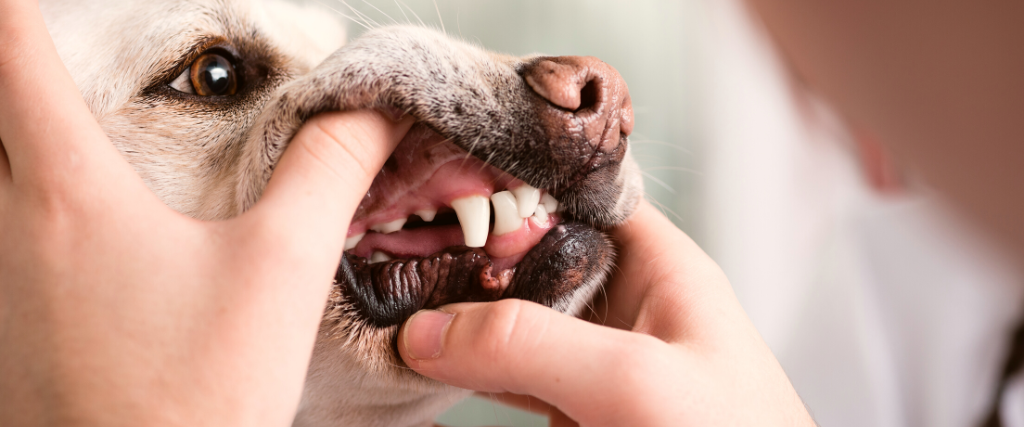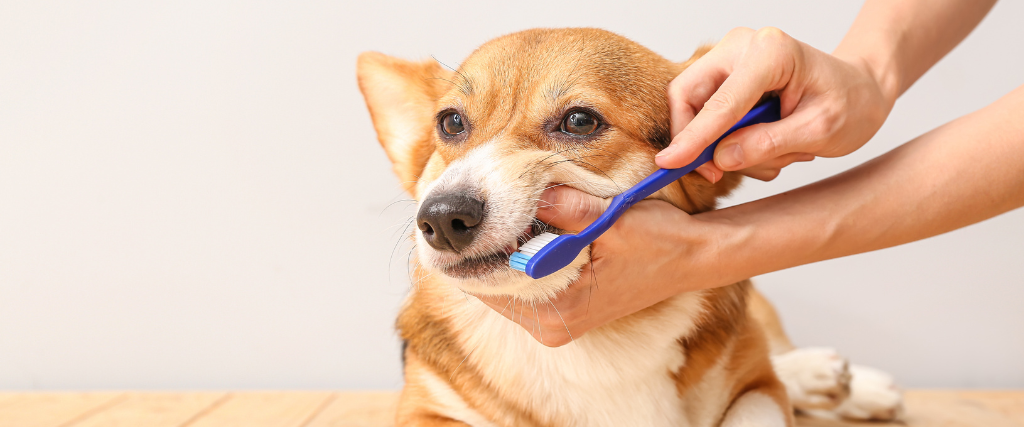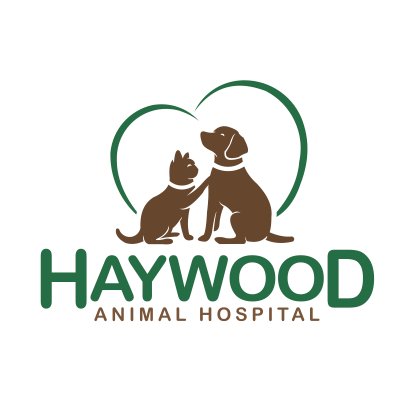As a pet parent, you undoubtedly want to do everything you can to help them live a healthy, happy life. This includes scheduling appointments for dental care. Pet dental care ranges from routine exams and cleanings to extractions and other procedures, all of which we perform while the patient is under anesthesia. This is because even examinations and cleanings can be difficult (and even unsafe) to perform on dogs who are not sedated.
After your dog has undergone a dental procedure, it is important to follow our instructions for post-op care. This will help your dog heal quickly and avoid any complications. Additionally, good home dental care is essential for all dogs in order to prevent future problems. As your dog’s veterinarian, we’d like to share some tips on post-op care and home dental care for dogs. Read on to learn more.
Why Post-Operative Dental Care Is Important for Dogs
Proper post-operative dental care for dogs is essential in preventing pain and avoiding infections. We will provide you with detailed aftercare instructions and let you know any specific things you need to do to care for your companion in the days following their procedure.
If they only had a routine exam and cleaning, aftercare is minimal. However, your dog will likely have more demanding aftercare needs if they underwent an extraction. By following our post-op care instructions, you can ensure a smoother recovery process for your pet and help prevent secondary problems from arising. Of course, if you have any questions or concerns during your canine companion’s recovery, we encourage you to reach out to us right away.
Don't Brush Your Pet's Teeth or Give Them Dental Treats in the Week Following their Dental Procedure
As you know, your pet underwent a dental procedure, and it is important to keep their mouth clean during the recovery process. However, if your dog had any oral surgery, to ensure your pet's safety and comfort, please do not brush their teeth or give them dental treats for at least one week. Letting the gums rest will help them heal faster and prevent infection. After the initial week has passed, you can resume your dog’s normal dental routine.

Provide Soft Food Following Major Dental Procedures
After undergoing any major dental procedure, your dog will need soft food. You could switch them to canned food or give them a mixture of cooked chicken and white rice. Pouring warm water over your dog’s kibble and letting it soak for 10 to 15 minutes may also be an option. In some circumstances, we may recommend a prescription diet to prevent stomach upset.
Giving your pet soft food helps prevent pain and discomfort. However, it's also important to keep in mind that giving your pet softer foods after a dental procedure lowers the risk of injury to the gums and underlying tooth structures while they heal. Doing so also protects any sutures or incisions in the mouth. Additionally, if we prescribe any antibiotics or pain medications following your dog’s procedure, soft food may aid in proper absorption.
Learn How to Brush Your Dog's Teeth at Home
Brushing your dog’s teeth at home between their regular dental appointments will help keep them clean and may even prevent future health problems. While it might seem intimidating, it’s actually quite simple and easy to do, as long as you are gentle and use the right equipment, including a toothbrush made for dogs and some canine-friendly toothpaste. We recommend using flavored enzymatic toothpaste daily to keep your pet’s pearly whites nice and clean.
Begin by carefully introducing your dog to the process. Let them sniff the toothbrush and toothpaste, and wait until they are calm before attempting to brush. When you are ready, put a little bit of toothpaste on the toothbrush. With your dog facing away from you, gently brush around the fronts and backs of their teeth. Stop if they seem overly stressed or uncomfortable. You may be unable to clean all of their teeth the first few times. That’s okay! Just keep practicing. When you’re finished, offer up lots of praise and yummy treats. Once you get in the habit of doing it, daily brushing should only take a few seconds each day.

Provide Vet-Approved Dental Toys and Treats
Regular brushing, yearly dental visits with your veterinarian, and keeping a closer eye on your furry friend's oral health are all great ways to ensure that your pup has a bright and happy smile. But in addition to these measures, providing vet-approved dental toys and treats for your dog is another way to help keep their teeth clean. Not only do these special treats help decrease plaque buildup, but pets also find them enjoyable and tasty. Purchasing toys and treats that promote dental health can lead to improved tooth and gum health while protecting your pet from harmful periodontal disease. When shopping, look for products that have been accepted by the Veterinary Oral Health Council (VOHC).
A few readily available VOHC-accepted dental treats include:
- Canine Greenies®
- Purina DentaLife Daily Oral Care Dog Treats
- Hill’s Science Diet Canine Oral Care Chews
- Pedigree® Dentastix™ Advanced
- Purina Pro Plan Dental Care
- Milk Bone Brushing Chews
Conclusion
Following these tips for post-operative dental care and at-home dental care will help your dog recover quickly and enjoy a healthy, happy smile. If you have any questions or concerns following your dog's dental procedure or if they are due for their next professional appointment, please don't hesitate to contact us. Our skilled team is here to give your canine companion the healthy teeth and gums they deserve.
As always, if you have any concerns or questions following your pet's dental procedure, please don't hesitate to give us a call.
